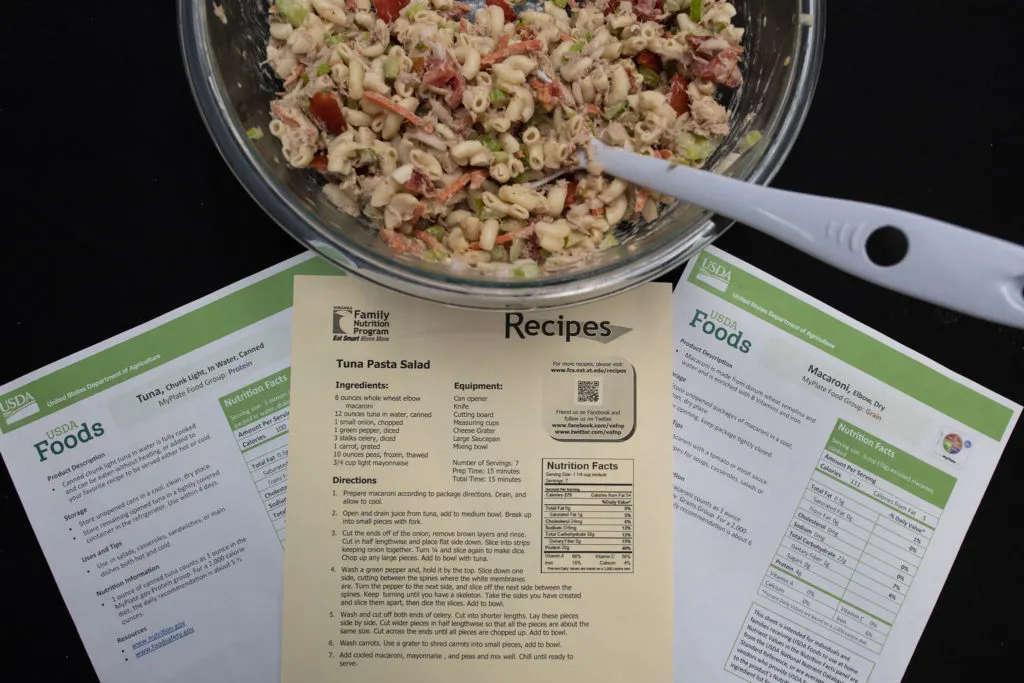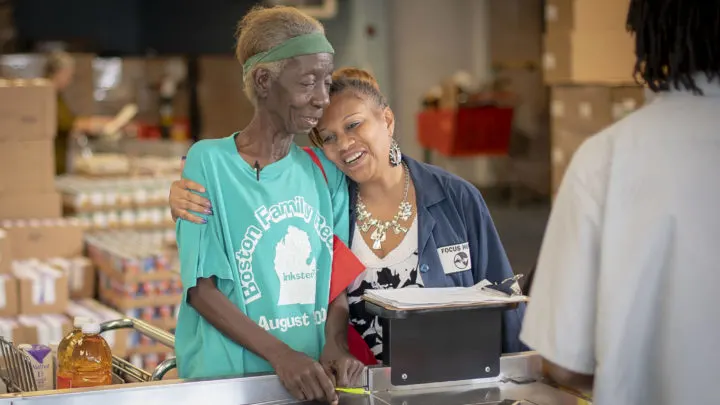Seniors, have you heard about the USDA Commodity food list? If not, this could change your life because seniors are able to get free, healthy, nutritious food from this incredible program. In this post, we’ll show you what that program is, what foods they provide, and how you can get the help that you need.
What is the USDA Commodity Supplemental Food Program?
The Commodity Supplemental Food Program (CSFP) exists to fill nutritional gaps for qualifying seniors 60 years and older. This federal program serves all 50 states and is administered by the Food and Nutrition Services agency. State agencies typically deliver the food to local agencies for distribution to qualified applicants – and there’s likely one near you!
What is the USDA Commodity Food List?
A variety of foods are included in monthly packages to help supplement nutritional needs that may be hard to meet with limited income. The USDA Commodity Food List is updated every year. Below are the items that seniors may be able to receive:
FRUITS:
- apple juice
- orange juice
- cranberry apple juice
- grape juice
- applesauce
- raisins
- canned fruits:
- apricots
- peaches
- pears
- plums
- mixed
VEGETABLES:
- dehydrated potatoes
- tomato juice
- vegetable soup
- canned vegetables:
- green beans
- canned vegetables:
- green beans
- carrots
- corn
- peas
- potatoes
- spinach
- sweet potatoes
- tomatoes
- mixed
LEGUMES:
- canned and dry beans
- lentils
PROTEINS:
- peanut butter
- canned chili and stew
- canned meats:
- beef
- chicken
- salmon
- tuna
DAIRY:
- American cheese
- shelf-stable or instant milk
GRAINS:
- cereals
- corn grits
- rolled oats
- pasta
- rice

CSFP also provides fact sheets for each of the foods provided! It gives details on the nutritional value and offers recipes and advice on how to cook and store the food item. These helpful pages may be found on the USDA Commodity Food List page.
Who is eligible?
Applicants must be 60 years of age or older and live in the United States or on a participating Indian reservation. Income limits are determined by the Federal Poverty Income Guidelines. These limits are determined by number of persons in the household as well as which state you live in. There may be additional requirements depending on your individual circumstances.
Save money on hearing aids!
Need help with hearing aids? No problem! You may be able to get affordable hearing aids that don’t break the bank through CareConnect USA’s secure affordable hearing aid line. Call them at 888-258-5305 now!
How do I calculate income?
The Income Guidelines give an annual limit to your household income. To qualify for CSFP, you must be at 130% or less than the figure on the table that corresponds to your state and household number. For instance: if you and your partner live in California, your poverty guideline number would be $17,420.
| Household Size | Federal Poverty Guidelines in 2021 |
| 1 | $12,880 |
| 2 | $17,420 |
| 3 | $21,960 |
| 4 | $26,500 |
| 5 | $31,040 |
| 6 | $35,580 |
| 7 | $40,120 |
| 8 | $44,660 |
For each additional household member, add $4540.
To determine if your income is 130% or less than the limit, simply multiply $17,420 by 1.3. If your annual income is $22,246 or less, you may qualify.
What qualifies as income?
This can be such a confusing question!
The legal reference to the USDA Commodity Supplemental Food Program regulations state that they “define ‘income’ as gross income before deductions for such items as income taxes, employees’ social security taxes, insurance premiums, and bonds”
Income includes:
Monetary compensation for services
Self-employment income
Social Security Benefits
Interest
Public assistance or welfare
Unemployment
Retirement or pensions
Alimony or child support
Regular contributions from people outside your household
Royalties
Other cash income
Are there income exemptions?
Yes! There are numerous income exemptions that include student loans, student lunch program assistance, Indian tribe court settlements, military housing allowance, Disaster Relief Act payments, Agent Orange Compensation program, certain child care payments, National Flood Insurance payments, and many others.
What if I’ve had recent changes in my income?
Don’t worry! Especially in pandemic times, many households have had income and support changes in the past year. CSFP regulations also provide for this.
“States and ITOs (Indian Tribal Organizations) may also authorize local agencies to consider the household’s average income during the previous 12 months and current household income to determine which more accurately reflects the household’s status, in accordance with 7 CFR Part 247.9(e)(4).”
How do I apply?
The USDA Commodity Supplemental Food Program resource map provides a list of public agencies and non-profit organizations that may distribute monthly food packages. Simply click on the state you live in to see the contact information for these agencies.
What if I need extra help?
We’ve provided information on who may qualify for benefits from the USDA Commodity Food List, as well as how to determine eligibility and where to go to receive benefits.
The government’s website for CSFP contains the USDA Commodity Supplemental Food List and additional information.
You may also contact CSFP at [email protected] or call them at 1-202-645-6087. They serve over 650,000 participants each month, see if you or your loved one qualifies!
Are there other resources for seniors?
Are you looking for assistance stretching your housing dollars? Finding meal programs for seniors? Making sure that you’re receiving full medical benefits? Check our senior resources just for you!


Catherine Marucci
Monday 2nd of October 2023
Hi Wanda. If the food resources above haven't been helpful, it may be be worth calling 211 to see if there are any programs or low-cost options that they can suggest. For electric, start here: https://lowincomerelief.com/power/